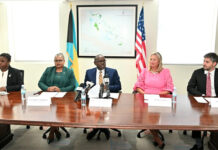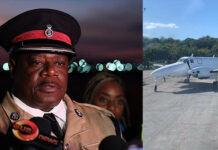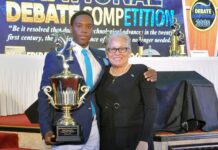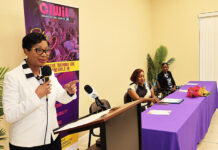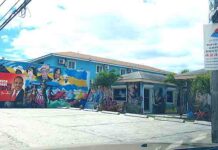Minister Tommy Turnquest at the Police Reserve passing out ceremony.
By: Matt Maura
NASSAU, The Bahamas — The continued cooperation between the United States of America and its law enforcement agencies and CARICOM, is critical to the region’s ongoing efforts to combat the illicit trafficking of firearms across the region, Minister of National Security the Hon. O.A.T. “Tommy” Turnquest said Tuesday, December 11, 2007.
Mr. Turnquest said the illegal gun trade has created a “Black Market” for the sale of firearms in the Caribbean. That “Black Market”, he said, has led to many of the gun-related crimes that are impacting The Bahamas and other Caribbean countries, signaling the need for continued cooperation.
Minister Turnquest said the “crackdown” on illegal firearms sales and smuggling operations within The Bahamas and the wider Caribbean is part of efforts aimed at reducing the amount of gun-related violent crime and criminality impacting the region.
Delivering the keynote address at the opening session of the CARICOM-U.S. Partnership to Combat Illicit Trafficking in Arms Seminar, in Nassau, Mr. Turnquest said the arms “Black Market” makes it possible for drug traffickers, gangs, migrant smugglers, terrorists and other criminal elements – including organized crime – to gain access to dangerous weapons “which increases the prospects of creating mayhem in our countries and our region.”
He said evidence shows that, in some instances, the illegal trafficking of small arms, light weapons and ammunition is merging with other “illicit trafficking phenomenon” such as illegal migrant trafficking and the illegal drug trade, to form a single criminal enterprise.
“Such criminal enterprises are engaging persons across national borders in much the same way that legitimate multi-national businesses do, bringing serious distortion to the concept of globalization,” Mr. Turnquest said.
“Whether arms in such enterprises are exchanged for money or for drugs, or are used to protect illicit shipments of persons or commit murders, assaults, robberies and other crimes; to intimidate and threaten and to enhance status, or other reasons, they contribute to the widespread availability of firearms in the region.
“Our efforts to combat the transnational phenomenon of illicit arms trafficking should therefore, extend beyond our own national efforts to encompass not only countries in the region, but other countries as well,” Mr. Turnquest added.
Minister Turnquest said the trafficking in illicit firearms in the Caribbean speaks “volumes” about the region’s “recognized vulnerability” to the problem of illicit trafficking, due to its location between the air and sea routes of Central and South America and North America and Europe.
The National Security Minister said the availability of small arms and some types of automatic weapons in Caribbean countries magnifies the need for cooperation on gun control between Caribbean countries, regional and international law enforcement agencies and the gun manufacturing countries of the world.
He said the importance of CARICOM’s cooperation with the United States to reduce the number of illegal guns that enter the region is highlighted even more by the fact that many of the illegal firearms found on the “Black Market” originate from the United States.
Citing statistics from 2006, Mr. Turnquest said that Bahamian law enforcement officials, with the cooperation of officials from the U.S. Bureau of Alcohol, Tobacco and Firearms (ATF), were able to trace 113 of the 170 guns seized in The Bahamas during that period.
Of that number, 83 guns, or 73 per cent, were found to have originated in the United States of America, primarily from the state of Florida.
Mr. Turnquest said the gun laws of The Bahamas restrict the importation of hand guns and automatic weapons to law enforcement agencies only, yet the number of hand guns and automatic weapons found in possession of criminal elements and their widespread availability on the streets, is a fact of life for The Bahamas, as it is for other Caribbean countries.
“It is a matter of record that CARICOM countries, including The Bahamas, have long and consistently articulated their concern regarding the proliferation of firearms in the region and particularly the illicit trafficking in arms,” Mr. Turnquest said. “Indeed, we are here today because of the commitment of our countries to halt and reverse this very dangerous trend.
“We know that in the United States, the gun trade is legal. It becomes an illegality when guns purchased legally are resold on the ‘Black Market.’ Through diversion, from legal channels, the legal becomes illegal. The now illegal firearms, small, portable and easy to conceal, are transported across borders, on pleasure crafts, private and commercial aircraft, hidden in commercial shipments and trafficked by other ingenious means intended to avoid detection.
“Without international cooperation of the kind offered at this seminar and the international treaty regime, countering the cross-border movement of firearms and enforcing national and international law would be a formidable proposition,” Mr. Turnquest added.




